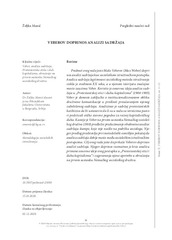Veberov doprinos analizi sadržaja
Weber's contribution to content analysis
| dc.creator | Manić, Željka | |
| dc.date.accessioned | 2021-10-12T13:13:42Z | |
| dc.date.available | 2021-10-12T13:13:42Z | |
| dc.date.issued | 2020 | |
| dc.identifier.issn | 2232-9641 | |
| dc.identifier.uri | http://reff.f.bg.ac.rs/handle/123456789/3033 | |
| dc.description.abstract | Predmet ovog rada jeste Maks Veberov (Max Weber) doprinos analizi sadržaja kao sociološkom istraživačkom postupku. Analiza sadržaja legitimnost sociološkog metoda istraživanja stekla je sredinom XX veka, a u njenom istorijatu značajno mesto zauzima Veber. Koristio je osnovnu ideju analize sadržaja u "Protestantskoj etici i duhu kapitalizma" (1904-1905). Veber je donosio zaključke o institucionalizovanom obliku društvene komunikacije u prošlosti proučavanjem njenog zabeleženog sadržaja. Analizirao je sadržaj protestantskih katihizisa da bi ustanovio da li su u radu sa vernicima pastori podsticali etičke stavove pogodne za razvoj kapitalističkog duha. Kasnije je Veber na prvom sastanku Nemačkog sociološkog društva (1910) predložio preduzimanje obuhvatne analize sadržaja štampe, koje nije naišlo na podršku sociologa. Njegov predlog predstavlja prvi metodološki osmišljen pokušaj da analiza sadržaja dobije mesto među sociološkim istraživačkim postupcima. Cilj ovog rada jeste da prikaže Veberov doprinos analizi sadržaja. Njegov doprinos razmatran je kroz analizu primene osnovne ideje ovog postupka u "Protestantskoj etici i duhu kapitalizma" i zagovaranja njene upotrebe u obraćanju na prvom sastanku Nemačkog sociološkog društva. | sr |
| dc.description.abstract | The subject of this paper is Max Weber's contribution to content analysis as a sociological research procedure. Content analysis gained the legitimacy of the sociological method of research in the middle of the 20th century, and Weber occupies a significant place in its history. He used the basic idea of content analysis in "The Protestant Ethic and the Spirit of Capitalism" (1904-1905). Weber drew conclusions about the institutionalised form of social communication in the past by studying its recorded content. He analysed the content of protestant catechisms to establish whether, in working with believers, pastors encouraged ethical attitudes conducive to the development of the capitalistic spirit. Later, at the first meeting of the German Sociological Society (1910), Weber proposed undertaking a comprehensive analysis of the content of the press, which did not receive the support of sociologists. His proposal represents the first methodologically designed attempt to give content analysis a place among sociological research procedures. The aim of this paper is to present Weber's contribution to content analysis. His contribution is considered through an analysis of the application of the basic idea of this procedure in 'The Protestant Ethics and the Spirit of Capitalism' and through advocating its use in speech at the first meeting of the German Sociological Society. | en |
| dc.publisher | Univerzitet u Banjoj Luci - Fakultet političkih nauka, Banja Luka i Institut za političke studije, Beograd | |
| dc.rights | openAccess | |
| dc.rights.uri | https://creativecommons.org/licenses/by/4.0/ | |
| dc.source | Politeia | |
| dc.subject | Veber | sr |
| dc.subject | Protestantska etika i duh kapitalizma | sr |
| dc.subject | obraćanje na prvom sastanku Nemačkog sociološkog društva | sr |
| dc.subject | analiza sadržaja | sr |
| dc.subject | Weber | en |
| dc.subject | The Protestant Ethic and the Spirit of Capitalism | en |
| dc.subject | speech at the first meeting of the German Sociological Society | en |
| dc.subject | content analysis | en |
| dc.title | Veberov doprinos analizi sadržaja | sr |
| dc.title | Weber's contribution to content analysis | en |
| dc.type | article | |
| dc.rights.license | BY | |
| dc.citation.epage | 22 | |
| dc.citation.issue | 20 | |
| dc.citation.other | 10(20): 11-22 | |
| dc.citation.rank | M52~ | |
| dc.citation.spage | 11 | |
| dc.citation.volume | 10 | |
| dc.identifier.doi | 10.5937/politeia0-29393 | |
| dc.identifier.fulltext | http://reff.f.bg.ac.rs/bitstream/id/1662/3030.pdf | |
| dc.type.version | publishedVersion |

